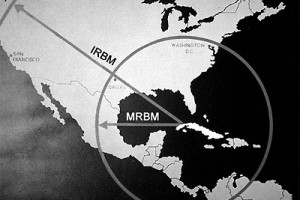The Cuban Missile Crisis at 60: 6 Timeless Lessons for Arms Control

(Russia Matters – russiamatters.org – Graham Allison – Oct. 4, 2022)
- “October marks the 60th anniversary of the most dangerous crisis in recorded history. In October 1962, U.S. President John Kennedy faced off with Soviet leader Nikita Khrushchev in an eyeball to eyeball confrontation, each with his nation’s nuclear arsenal in hand. … Over the decades since, key lessons from the crisis have been adapted and applied by the successors of Kennedy and Khrushchev to inform fateful choices. Of the many lessons from this nearly apocalyptic episode, six offer timeless insights for arms control.”
- “First, to survive in a world of mutually assured destruction or MAD, a nuclear power must constrain itself and find ways to persuade its nuclear adversary to constrain itself.”
- “Second, from the brute fact that ‘a nuclear war cannot be won’ because at the conclusion the attacker would also have lost their own society, U.S. President Ronald Reagan drew a large categorical imperative: a nuclear war ‘must therefore never be fought.’ Reagan’s often-repeated one-liner, that ‘a nuclear war cannot be won and must therefore never be fought,’ almost says it all.”
- “Lesson three spotlights the necessity for communication, especially private communication, between leaders of nuclear-armed states.”
- “Kennedy believed that the most important lesson of the missile crisis was the necessity for mutual constraints, which he understood required unilateral constraints.”
- “The fifth lesson requires that adversaries find ways to constrain their own unilateral activities, including in explicit agreements, as the price for inducing their adversary to accept mutual restraints.”
- “The sixth lesson recognizes that to avoid future confrontations like the Cuban missile crisis would require finding ways to prevent the spread of nuclear weapons to additional states.”
- “Given the pressures for further proliferation of nuclear weapons resulting from the lessons leaders are now drawing from Russia’s war against Ukraine, as well as the U.S. invasion of Iraq in 2003 and the toppling of Libyan leader Moammar Gaddafi in 2011, sustaining this success will require another burst of strategic imagination and relentless effort in the decades ahead.”
Read the full article at Arms Control Today.
Article also appeared at russiamatters.org/analysis/cuban-missile-crisis-60-6-timeless-lessons-arms-control, with different images, bearing the notice: “© Russia Matters 2018 … This project has been made possible with support from Carnegie Corporation of New York,” with a footer heading entitled “Republication Guidelines” linking to: russiamatters.org/node/7406, which bears the notice, in part:
“If you would like to reprint one of these articles, a blog post written by RM staff, one of our infographics or a fact-check, we ask that you follow these guidelines:
- Include a prominent attribution to Russia Matters as the source and link back to the original at RussiaMatters.org.
- Retain the hyperlinks used in the original content.
- Do not change the meaning of the article in any way.
- Get an ok from us for non-substantive changes like partial reprints or headline rewrites and inform readers of any such modifications (e.g., This article first appeared on the Russia Matters website with the headline “Russian Election Interference in Trump’s Own Words”).
- Let us know about the reprint and send a link!
Please note that Russia Matters cannot grant permissions for third-party content, including articles, photographs and other materials not produced by our team.
Questions? Email us at RussiaMatters@hks.harvard.edu.”
